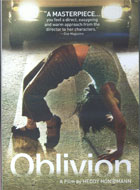
Oblivion (El Olvido) 2008
Distributed by Icarus Films, 32 Court St., 21st Floor, Brooklyn, NY 11201; 800-876-1710
Produced by Carmen Cobos
Directed by Heddy Honigmann
DVD, color, 93 min.
Sr. High - Adult
Economics, Political Science, Sociology, South American Studies, Urban Studies
Date Entered: 08/20/2009
Reviewed by Wendy Highby, University of Northern ColoradoHow have decades of hyperinflation, economic ruin, political corruption, and terrorism affected the daily lives of urban Peruvians? Oblivion beautifully embodies the old saw that “the personal is political.” The marginalized classes of Lima, Peru are portrayed in Heddy Honigmann’s documentary. A variety of laborers are filmed, including food service workers, street buskers, vendors, and shoeshine boys. Honig deftly weaves personal pain, political irony, and socioeconomic reality into a masterful celluloid tapestry. Footage of several decades of Peruvian presidential inauguration ceremonies provides the political framework. The archival material is intercut with interviews of the service workers, some of whom have served politicians. This compelling depiction of the gap between rich and poor is alternatingly amusing and heart-wrenching. The film’s emotional arc ranges from the wry wisdom of a debonair bartender to the sadness of a shoeshine boy who claims to possess neither memories nor dreams.
The film artfully and effectively demonstrates socioeconomic conditions, stratification, and political cynicism. It is a powerful educational resource for a wide range of social studies and social sciences educators. In addition to social science applications, it deserves an even wider audience for its aesthetic and humanitarian value.
Awards
- International Film Critics (FIPRESCI) Prize,
- Silver Dove
- Prize of the Ecumenical Jury, all from the 2008 Leipzig Festival for Documentary and Animated Films